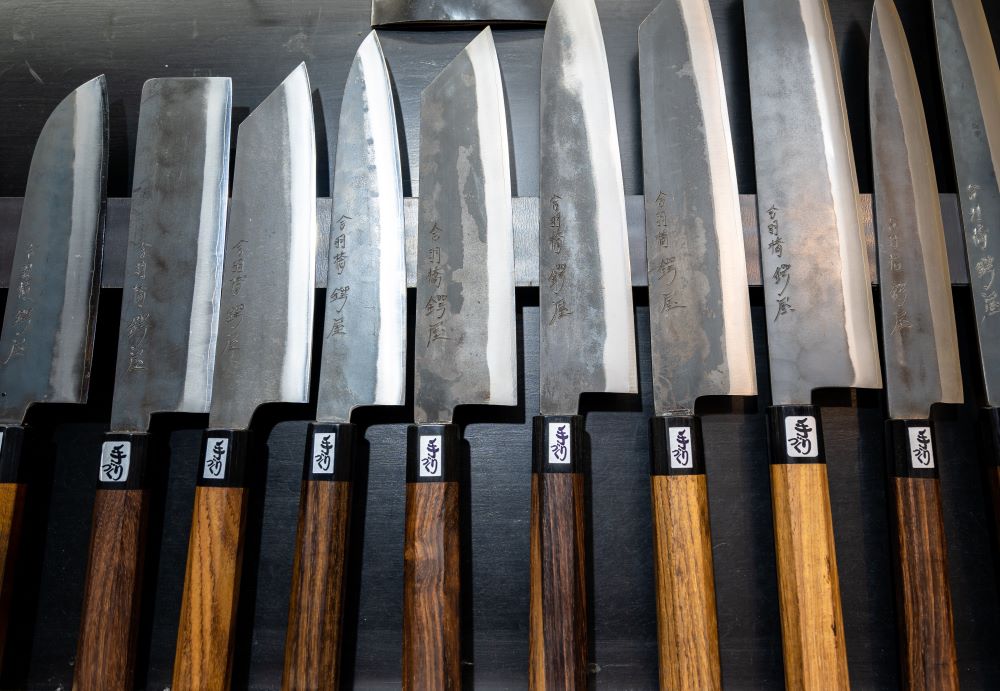
When it comes to kitchen knives, there are many options available on the market. From German to French to American, and yes, Japanese, there is a wide variety of styles and brands to choose from. So which of those really produce the best knives? There’s a lot to consider in what makes a knife exceptional, and Japanese knives have gained a strong reputation for being some of the best knives in the world, known for their exceptional sharpness, durability, and craftsmanship. So, let’s explore why Japanese knives may be considered to be the best and what makes them stand out from others around the world.
The Craftsmanship of Japanese Knives

One of the reasons why Japanese knives are so highly regarded is the level of craftsmanship that goes into their production. Japanese knives are typically handmade by skilled artisans who have undergone years of training to perfect their craft. These artisans use traditional techniques and high-quality materials to create knives that are not only functional but also beautiful. The attention to detail and precision that goes into each knife is what sets Japanese knives apart from others.
The forging process of Japanese knives involves heating and hammering the steel repeatedly to create a blade that is both strong and sharp. The blade is then sharpened and polished by hand to create a razor-sharp edge. This process can take several days to complete, but the end result is a knife that is not only sharp but also has a unique aesthetic appeal.
In addition to the forging process, the handles of Japanese knives are also carefully crafted. Many Japanese knives feature handles made from high-quality woods such as ebony or rosewood. These handles are not only beautiful but also provide a comfortable grip for the user. The level of craftsmanship that goes into each Japanese knife is truly impressive and is a testament to the skill of the artisans who make them.
Why Sharpness Matters

Sharpness is one of the most important factors to consider when choosing a knife. A sharp knife not only makes food preparation easier but also safer. A dull knife requires more force to cut through food, which can lead to slips and injuries. A sharp knife, on the other hand, cuts through food effortlessly, reducing the risk of accidents.
Japanese knives are known for their exceptional sharpness. The forging process used to create Japanese knives results in a blade that is thinner and sharper than most other knives. This sharpness is due to the high carbon content in the steel used to make the blades. High-carbon steel is able to hold a sharper edge for longer periods of time than other types of steel. This means that Japanese knives require less sharpening than other knives, making them more convenient to use.
Another reason why sharpness matters is the quality of the cut. A sharp knife produces clean cuts, which can help to preserve the flavor and texture of the food being prepared. A dull knife, on the other hand, can crush and tear the food, resulting in a subpar culinary experience. Japanese knives are able to produce precise, clean cuts, making them ideal for preparing delicate dishes such as sushi or sashimi.
The Benefits of High-Carbon Steel
As previously mentioned-carbon steel is one of the key factors that contribute to the sharpness and durability of Japanese knives. High-carbon steel is a type of steel that contains a higher percentage of carbon than other types of steel. This higher carbon content makes the steel harder and stronger, allowing it to hold a sharper edge for longer periods of time.
In addition to its sharpness, high-carbon steel also has other benefits. It is more resistant to rust and staining than other types of steel, making it ideal for use in kitchen knives. High-carbon steel is also less likely to chip or break than other types of steel, which increases the lifespan of the knife.
However, high-carbon steel does require more maintenance than other types of steel. It is important to keep the blade dry and well-oiled to prevent rust and corrosion. Additionally, high-carbon steel is more prone to rust and staining if not properly cared for. But with proper maintenance, the benefits of high-carbon steel outweigh the extra effort required to maintain it.
Why Japanese Knives are More Durable than Others
Durability is another important factor to consider when choosing a knife. A durable knife can withstand heavy use and maintain its sharpness over time. Japanese knives are known for their exceptional durability, thanks to the high-quality materials and craftsmanship that go into their production.
The forging process used to create Japanese knives results in a blade that is not only sharp but also strong. The repeated heating and hammering of the steel creates a blade that is able to withstand heavy becoming damaged. Additionally, the use of high-carbon steel makes the blade more resistant to chipping and breaking than other types of steel.
The handles of Japanese knives are also designed for durability. Many Japanese knives feature handles made from high-quality materials such as wood, which are able to withstand heavy use without becoming damaged. The handles are also designed to provide a comfortable grip for the user, reducing the risk of hand fatigue during use.
So, are Japanese knives the best?
.0
The evidence here would point to yes. There's no denying that Japanese knives are some of the most well-crafted and versatile knives on the market. The level of craftsmanship that goes into their production, the exceptional sharpness, the use of high-carbon steel, and the durability are all factors that contribute to their superiority. Japanese knives are not only functional but also beautiful, making them a great addition to any kitchen. If you are looking for a high-quality knife that will last for years to come, a Japanese knife is most definitely the way to go.
